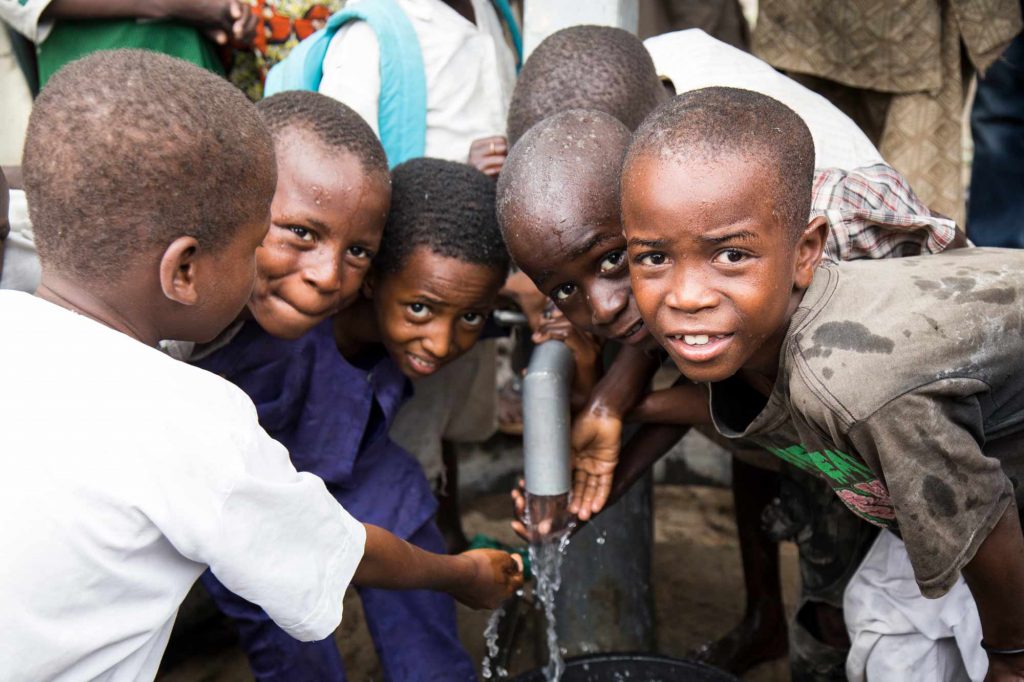
Water
Water, Sanitation & Hygiene
International Medical Corps works with the beneficiaries to meet their water needs in emergency and development contexts through provision of adequate, safe, potable water for drinking, personal and domestic hygiene at community and institutional facilities.
Access to safe water is an essential component in the fight to reduce the burden of disease, whether it is diarrhea, pneumonia, eye and skin infections or life-threatening illnesses such as malaria, cholera and typhoid. IMC strongly believes that improved access to safe water can reduce diarrheal disease rates by as much as 25%. Still, nearly 800 million people in the world today lack access to safe drinking water.
Larger volumes of water are also essential to maintain infection-free environments within the health care facilities established to handle patients with highly communicable and contagious illnesses such as Ebola Virus Disease.
Our Response
International Medical Corps operates WASH programs in some of the world’ s most inaccessible and dangerous environments to provide lifesaving water to those in great need. These programs include:
NIGERIA, in the homeland of Boko Haram.
International Medical Corps is working in six local government areas (LGAs) in Northeastern Nigeria’s Borno State—the epicenter of the humanitarian crisis triggered by the ongoing conflict with Boko Haram. Our goal there is to improve access to safe drinking water, sanitation, and hygiene for nearly 300,000 Internally Displaced people (IDPs). We work in displacement camps and communities hosting large numbers of IDPs to create sources of safe drinking water through diverse methods such as rehabilitating boreholes, using solar-powered submersible pumps, and disinfecting (chlorinating) water at the source and at household level. This infrastructure is complemented by teams of community volunteers who educate families on the importance of personal hygiene in health and how to prevent potentially deadly waterborne diseases, like diarrhea and cholera.
YEMEN, amid civil war and a major cholera outbreak.
International Medical Corps provides critical water trucking, delivering thousands of liters daily to health facilities and communities, many of which are frequently without access to adequate clean water due to shortages in fuel needed to pump the water. We also rehabilitate water supply systems in health facilities and train staff working at International Medical Corps-supported health facilities. In response to one of the world’s largest cholera outbreaks, we have responded in five of the country’s most severely hit governorates, areas that include the capital, Sana’a, the southern port city of Aden, as well as Taizz and Ibb. We have set up Diarrhea Treatment Units and Centers as well as more than 20 Oral Rehydration Points, distributed hygiene kits, water purification tablets, and IV fluids.
ETHIOPIA, in drought-affected areas.
In the Wolayta Zone, about 200 miles south of the capital, Addis Ababa, International Medical Corps is assists residents in a densely-populated region as they struggle to survive amid deteriorating drought conditions. In addition to programs designed to address deteriorating malnutrition and food security conditions, we also provide potable water to those living in the Damot and Boloso Sore areas. In total our Ethiopia team administers 11 active projects, with the majority of them addressing critical water shortages and deteriorating nutrition levels.
ZIMBABWE, innovating to bringing water to underserved areas.
International Medical Corps carried out an innovative pilot scheme to provide drinking water to 600 households in the Mashonaland Central Province in northeastern Zimbabwe where accessible potable water was in short supply. In some villages, a single bore hole serviced over 300 households. Using local materials, we constructed bio-sand filters filled with layers of gravel and sand onto which water is poured for filtration. Each filter can produce up to 240 liters per day of clean water that is 95% free of bacteria and 100% free of parasites. These filters function for up to 10 years before the filtration material needs to be replaced at a modest cost.
In 2016, International Medical Corps built or rehabilitated 181 sources of potable water.
In Greece, we trucked in over 3.7 million liters of potable water and emptied more than 9.6 million liters of sludge from refugee camps
More than 2,600 individuals received training as part of our WASH programs in 2016.